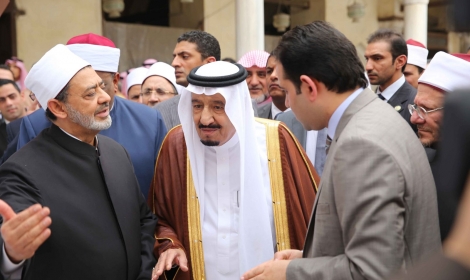
RNA – Hujjat al-Islam Mohammad Raeji, a researcher in the Islamic Seminary of Qom, has written a report for Rasa News Agency on the influence of Wahhabism in Egypt’s renowned Sunni Muslim academic institution, al-Azhar University.
The influence of Wahhabism in al-Azhar, though it began many years ago, has grown significantly in recent decades. By paying huge sums of money to the Egyptian government and religious officials, Saudi Arabia has been able to buy positions at al-Azhar in order to coordinate and manage the Wahhabi creed. Although extremists have long struggled to infiltrate al-Azhar and use this Islamic pillar as a platform for the dissemination and promotion of extremism in the world for many years, al-Azhar has long been able to resist them, but ultimately the Takfiri ideology of Wahhabism was able to calmly gain ground in al-Azhar.
The Wahhabi ideology, as the spiritual father of terrorism and Saudi Arabia, as the largest sponsor of Takfiri terrorism, have managed to influence the language of the religious scholars of al-Azhar and they have issued statements of takfir or excommunication against the followers of other religions and denominations and have accused them of debauchery, lasciviousness and heresy. They have allotted and divided the people into paradise and hell.
In the shadow of the influence of Wahhabism in al-Azhar, this great religious centre in the Islamic world has lost its true position in guiding the Islamic ummah in regards to challenging issues, to the extent that the positions of al-Azhar do not have any adherents among the people of Islamic countries, especially Egypt. By injecting Wahhabi ideologies into students and scholars of religious sciences in al-Azhar, they have educated elite with the Wahhabi ideology that simply excommunicates others. In such circumstances, al-Azhar is far removed from the podium of Islam, many of its decisions remain on paper and the Egyptian people prefer to gather around the flag of Islam as a religion of mercy, compassion, love, brotherhood and equality and oppose the path of atheism and Godlessness.
The seizure of al-Azhar by the Wahhabi ideology is a serious threat to the Islamic ummah and their religious beliefs, especially since many of the religious scholars and influential religious figures in Egypt have become the hirelings of the Al Saud in suppressing the opponents of their policies in the region. Through these policies, they seek to create conflict and divisiveness and ultimately, the collapse of the Islamic ummah. Meanwhile, the role of al-Azhar has become an institution for the theorizing the behavioural policies of the Al Saudi so they can promptly issue decisions or fatwas to lead their opponents astray but in fact, this Wahhabi ideology has nothing to do with genuine Islam and is the main cause of extremism.
The influence of Wahhabism in al-Azhar is such that at any time a academic, religious elite, political or social analyst and even if an scholar or a cleric at al-Azhar wants to protest against the dangers of Wahhabism, the defenders of Wahhabism from within al-Azhar will stand against these individuals and suppress them with slanders of nationalism, supporting Shi’ahs, sectarianism etc. and nip their cries of opposition in the bud. Saudi Arabia has been able to take hold of the religious pulse of Egyptian society through its influence in al-Azhar and through the education of scholars favourable to themselves and by forbidding the opposition to breathe or express their own opinions.
Although the threat of Wahhabism to the Islamic world is not less than the threat of the Zionist regime, some political analysts and religious experts in the Islamic world describe Wahhabism the greatest threat to the Islamic ummah because it contains behaviour and ideologies which promotes terrorism, violence, extremism, Takfirism etc. but the Grand Imam of al-Azhar [Ahmad al-Tayyib] and Egyptian religious leaders have been silent in the face of this danger.
If al-Azhar believes that “the scholars are the heirs of the prophets,” and if they know that the Wahhabi ideology has become a factor in the spread of terrorism and insecurity in the region and has led to the slaughter of thousands of innocent Yemenis, Iraqis, Lebanese, Syrians and Palestinians, then it is their religious and religious obligation to stand against this dejected and deviant ideology with all their ability and restore this religious institution to its original path, which is moderation, once again.
The scholars who have considered it their duty to propagate the religion of God must know that: “Those who deliver the messages of God and fear Him, and fear no one except God, and God suffices as reckoner” [Holy Quran: 33:39]. The scholars of religion must respond to the crimes of the Saudis in the region. They must stand against the excesses of the Al Saud and the crimes of this hereditary government and this is only possible when they end their financial dependence on the government and close all the paths for Wahhabi influence in al-Azhar. Only then can the Egyptian religious community avoid entangling themselves in extremist and distorted ideologies.
112/974